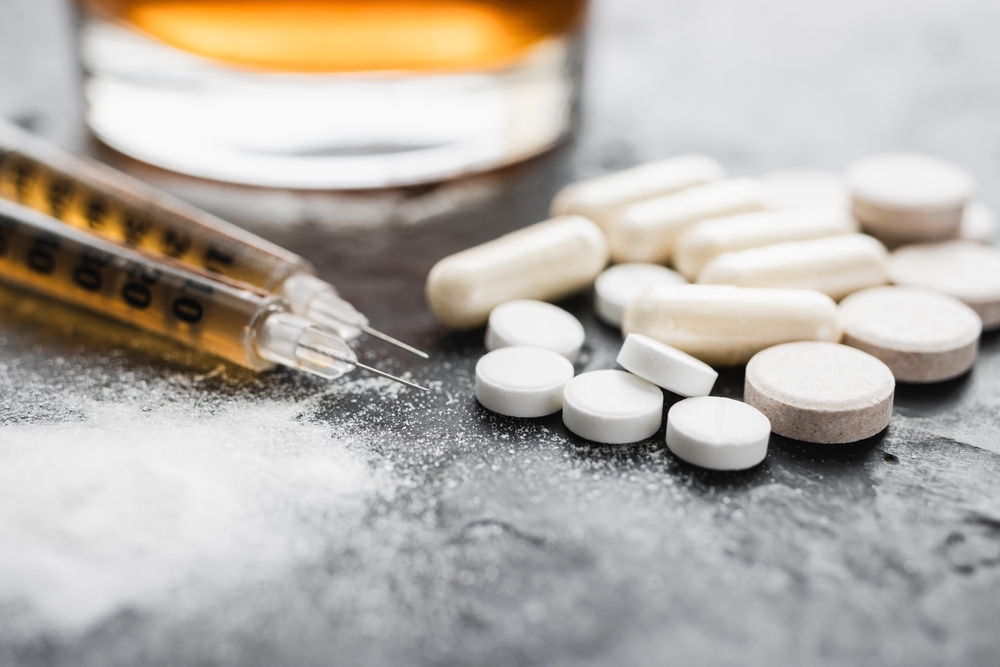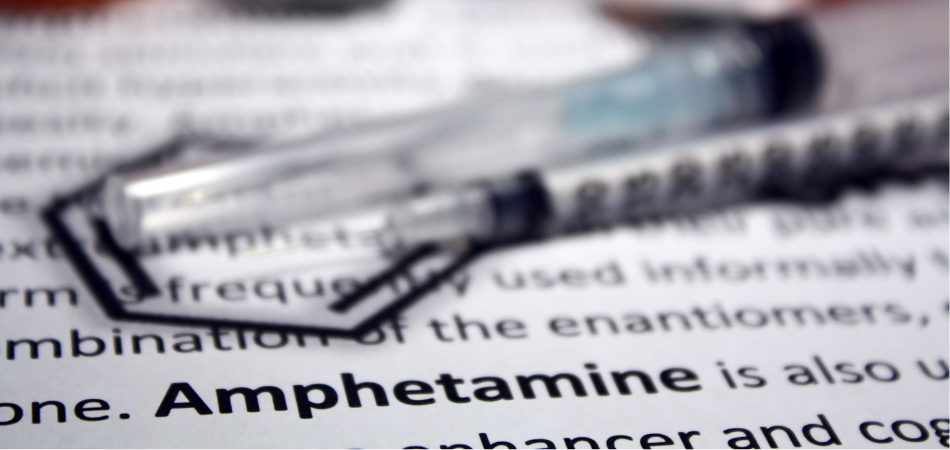
Written by:

Medically Reviewed by:
Last Updated:
February 25th, 2025
Amphetamine Addiction | Signs, Symptoms & Effects
Amphetamines are found in many prescription drugs, but these legal medicines can be just as dangerous as illegal substances. Anyone who takes amphetamines for a legitimate medical reason or abuses them to get high or self-medicate must understand the risks that amphetamines can pose. One of the biggest dangers is amphetamine addiction, a potentially life-threatening condition that can greatly harm both amphetamine users and the people they care about.
What are amphetamines?
Amphetamines are drugs that are designed to make you feel more awake, focused and energetic. Doctors sometimes give them to treat certain medical conditions, like attention deficit hyperactivity disorder (ADHD) and narcolepsy (a sleep disorder), helping people with these conditions feel more alert and able to concentrate.
Some common amphetamines prescribed in the UK include:
- Adderall: A mixture of four amphetamine salts that helps people with ADHD stay focused and less hyperactive.
- Dexedrine (Dextroamphetamine): Used for ADHD and narcolepsy to improve concentration and alertness.
- Vyvanse (Lisdexamfetamine): Treats ADHD and binge eating disorder by improving focus and self-control.
- Ritalin (Methylphenidate): Not exactly an amphetamine but often grouped with amphetamines due to similar effects. Helps people with ADHD and narcolepsy focus better and stay awake.
- Concerta (Methylphenidate): A long-lasting version of Ritalin that helps people with ADHD with all-day focus.
- Evekeo (Amphetamine Sulfate): Used for ADHD and narcolepsy to help with attention and wakefulness.
Amphetamines and similar medicines are considered Class B drugs, meaning it is illegal to possess, supply or produce them without a doctor’s prescription. They are also Schedule 2 drugs, which means there are special rules for doctors and pharmacies about how they can give out these medicines and how they must be stored. These rules help make sure the drugs are used safely and only by the people who really need them.
What is amphetamine addiction?
Amphetamine addiction is when someone can’t stop using amphetamines, even if it’s causing problems in their life. Using amphetamines can have many medical benefits, and even for those who are misusing the drugs, it may seem harmless and helpful at first. For some people, however, this initial positive experience is just the first in several amphetamine addiction stages.
After using amphetamines for a long time, some people find they need more amphetamines to feel the same effects, which is called tolerance. Their body and mind then become dependent on amphetamines, making it hard to function without them. Eventually, using amphetamines becomes a habit they can’t control, leading to serious problems in health, relationships and daily life.
As with other forms of drug addiction, there are several different ways people can become addicted to amphetamines, including:
Prescription misuse
Some people start using amphetamines because they were prescribed for medical reasons like ADHD or narcolepsy but begin taking higher doses or using them more often than directed.
Recreational use and improved performance
Some people take amphetamines to get high, increase energy or improve focus. This often includes athletes and students who may use amphetamines to improve performance or stay awake for long periods.
Self-medication
Other people might start using amphetamines to cope with stress, depression or anxiety, thinking the drug will help them feel better but ultimately finding their struggles becoming worse because of addiction.
Amphetamine addiction and abuse can be potentially deadly. In 2022 alone, there were 114 deaths in England and Wales caused by amphetamines. This is not as high as drugs like opiates, but it shows that amphetamines can still be very dangerous, especially when misused.
Amphetamine addiction symptoms to look out for
It’s important to know if you or someone you care about might be addicted to amphetamines so you can get the help you need. Here are some possible amphetamine addiction symptoms to look out for:
- Always thinking about amphetamines and wanting to use them.
- Struggling to stop using amphetamines even if you try.
- Having to take larger amounts of amphetamines to feel the same effects.
- Missing work, school or other important activities because of using amphetamines.
- Becoming secretive, lying about amphetamine use or spending time with different people.
- Running out of prescription amphetamines before you’re supposed to.
- Feeling tired, depressed or easily annoyed when not using amphetamines (amphetamine addiction withdrawal).
If you are worried because you can see some of these signs in yourself or someone you know, reach out for professional help as soon as possible.
Why are amphetamines addictive?
There are several ways people can become addicted to amphetamines, including how they use the drug, personal factors, ADHD and their environment. Each of these factors plays a role in how likely someone is to develop an amphetamine addiction:
- Snorting or injecting amphetamine pills
- A personal or family history of substance abuse or addiction
- Mental health issues and using amphetamines to self-medicate
- Being able to get amphetamines easily
- Friends who use amphetamines and other drugs
- A stressful life and taking amphetamines to cope
Amphetamine addiction and ADHD are often linked as people prescribed the drugs for symptoms may start misusing them or taking more than their doctor prescribed. This is why it’s important always to follow the doctor’s instructions and talk to a healthcare professional if you have any concerns.
Why is amphetamine addiction so dangerous?
Amphetamine addiction can cause serious health problems and many other issues in your life. Knowing these dangers can help you understand why it’s important to avoid amphetamine abuse and get help if needed:
Health dangers
- Heart problems: Using amphetamines can damage your heart, leading to high blood pressure, irregular heartbeats and even heart attacks.
- Mental health issues: Amphetamines can make you feel very anxious and paranoid or cause you to see or hear things that aren’t there. Long-term use can lead to depression and severe mental illness.
- Physical health: You might lose a lot of weight, have poor nutrition and suffer from dental problems because amphetamines can make you not want to eat.
- Sleep issues: Amphetamines can affect your sleep, making it hard to fall asleep or stay asleep, which can lead to severe tiredness.
- Amphetamine overdose: Taking too much amphetamine can cause an overdose, which can be life-threatening. Symptoms include severe agitation, rapid heartbeat, high fever, seizures and, in extreme cases, death.
Other personal consequences
- Relationship problems: Addiction can cause fights and mistrust with family and friends, leading to the breakup of relationships, loneliness and isolation.
- Work and school issues: Amphetamine addiction can make it hard to focus and do well at work or school, which can lead to getting fired or failing and future financial and personal problems.
- Legal trouble: Using amphetamines illegally or doing illegal things to get them can lead to being arrested. In the UK, amphetamines are a Class B drug with long prison sentences for possession, supply and production.
How is amphetamine addiction treated?
Amphetamine addiction treatment involves three main steps. First, drug detox helps your body clear the drug with medical help to manage amphetamine withdrawal symptoms. Next, drug rehab treatment provides therapy to teach you how to cope without drugs and understand why you used them. Finally, aftercare includes ongoing support through therapy, support groups and healthy lifestyle changes to stay drug-free.
Get help for amphetamine addiction today
If you or someone you care about is struggling with amphetamine addiction, recovery is possible with the right support and treatment. Linwood House offers a safe and supportive environment where you can begin your journey to recovery. Our experienced team is dedicated to helping you overcome amphetamine addiction and regain control of your life. Don’t wait – contact Linwood House today to learn more about our treatment programmes and how we can help you start a new, healthier chapter.
Frequently asked questions
(Click here to see works cited)
- Stewart, Conor. “Number of drug-related deaths due to amphetamine use in England and Wales from 1993 to 2022.” Statista, https://www.statista.com/statistics/470819/drug-poisoning-deaths-by-amphetamine-in-england-and-wales/. Accessed 3 June 2024.
- UK-Rehab. “Addiction To Amphetamines | UK Rehab.” UK-Rehab, https://www.uk-rehab.com/drug-addiction/amphetamines/. Accessed 3 June 2024.
- Khoramizadeh, Mansour et al. “Treatment of amphetamine abuse/use disorder: a systematic review of a recent health concern.” Daru : journal of Faculty of Pharmacy, Tehran University of Medical Sciences vol. 27,2 (2019): 743-753. doi:10.1007/s40199-019-00282-3





